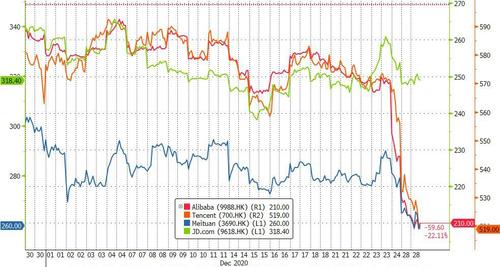China’s Antitrust Crackdown On Tech’s Giants Leads To Massive Losses
China’s continued crusade against Jack Ma – which may or may not culminate with Beijing tearing apart his fintech giant, Ant Financial on anti-trust grounds – led to a second day of frenetic selling among China’s largest tech firms, driven by an investor panic Beijing’s crackdown on financial intermediaries and antitrust scrutiny would spread beyond Jack Ma’s internet empire and engulf the country’s most powerful corporations.
As Bloomberg reports, Alibaba and its three biggest rivals – Tencent, food delivery giant Meituan and JD.com – were hammered in the past 48 hours, losing nearly $200 billion in the two sessions since Thursday when regulators revealed a probe into alleged monopolistic practices at Ma’s company, which was followed on Sunday by comments from PBOC deputy governor Pan Gongsheng who slammed the world’s biggest fintech company, Ant Financial, which is also owned by Ma saying it “must return to its origins in online payments and prohibit irregular competition, protect customers’ privacy in operating its personal credit rating business, establish a financial holding company to manage its businesses, rectify any irregularities in its insurance, wealth management and credit businesses, and run its asset-backed securities business in accordance with regulations.”
Traders were stunned by what appears to be the formal start of the Communist Party’s crackdown on not just Alibaba but also, potentially, the wider and increasingly influential tech sphere; as a result they quickly puked the Chinese tech megacaps, with Alibaba falling 8% Monday in Hong Kong, losing $270 billion of value since its October peak. Tencent and Meituan also tumbled more than 6%. Alibaba rival JD.com slid roughly 2%.
“The Chinese government is putting more pressure or wants to have more control on the tech firms,” Jackson Wong, asset management director at Amber Hill Capital, told Bloomberg. “There is still very big selling pressure on firms like Alibaba, Tencent or Meituan. These companies have been growing at a pace deemed by Beijing as too fast and have scales that are too big.”
So far Beijing’s ultimate intentions vis-a-vis Jack Ma and his online tech empire remain unclear, but as we noted yesterday, “the worst case scenario would be for Ant to forgo its money management, credit and insurance businesses, halting its operations in the units that service half a billion people. Its wealth management business which includes the Yu’ebao platform that sells mutual funds and money market funds, accounted for 15% of revenue.”
Today Bloomberg picks up on this, writing that “investors remain divided over the extent to which Beijing will go after Alibaba and its compatriots as Beijing prepares to roll out the new anti-monopoly regulations. The country’s leaders have said little about how harshly they plan to clamp down or why they decided to act now.”
As Bloomberg adds, it’s unclear what concessions regulators may try to wring from Alibaba. Under the existing Antitrust Law, which is undergoing revisions to include the internet industry for the first time, Beijing can fine violators up to 10% of their revenue. In Alibaba’s case, that could mean a levy of as much as $7.8 billion.
Of course, the heavily sold tech names aren’t just sitting their: on Monday Alibaba raised its stock repurchase program by $4 billion to $10 billion, effective for two years through the end of 2022. But the buyback program was overwhelmed by fears that the steps taken against Ant are just the tip of the iceberg. While the central bank stopped short of calling for a breakup, the financial services giant now needs to present specific measures and a timetable for overhauling its business.
The State Administration for Market Regulation dispatched officials to Alibaba’s Hangzhou headquarters last Thursday and the on-site investigation was completed on the day, according to local news reports. The People’s Daily — the Communist Party mouthpiece — ran a commentary over the weekend warning Alibaba’s peers to take the antitrust investigation into Alibaba as a chance to lift their own awareness of fair competition.
Meanwhile, as we noted over the weekend, the formerly outspoken Ma has vanished from public view since Ant’s IPO got crushed by Beijing in the last moment in November. As of early December, Ma was advised by the government to stay in the country, a Bloomberg source said.
What happens next?
According to Bloomberg, “some analysts predict there’s a crackdown coming, but a targeted one.” They point to language in the regulations that suggests a heavy focus on online commerce, from forced exclusive arrangements with merchants known as “Pick One of Two” to algorithm-based prices favoring new users. The regulations specifically warn against predatory pricing – selling below cost – to weed out rivals.
“As this latest investigation occurs at a time when China is ready to take action against monopolistic practices, we think SAMR might want to use BABA’s case as a precedent to send a message to the rest of the industry that the authority is determined this time to address the” pricing issue, Nomura analysts wrote in a note Monday.
Tyler Durden
Mon, 12/28/2020 – 19:20
via ZeroHedge News https://ift.tt/2MgUTxl Tyler Durden
